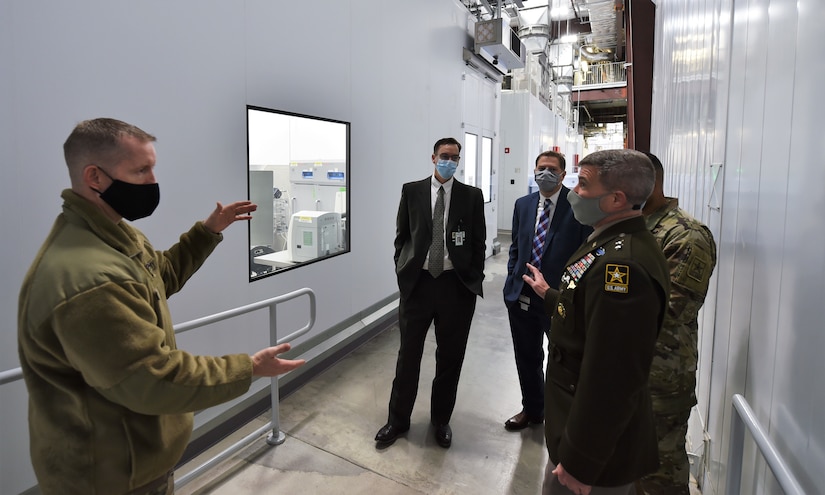Feb. 25, 2021 |
''We've always had officers who train with industry for four to six months,'' said Army Maj. Gen. Chris Sharpsten, deputy director of supply, production and distribution for the Vaccines and Therapeutics Operation under the federal COVID-19 response, formerly known as Operation Warp Speed. ''But it's a single officer who goes to work with an industry related to their branch, and they take the expertise they gain from the industry and bring it back to the services.''
This effort, he said, was different.
''I will tell you, in the 32 years I've been in the Army, I've never seen anything quite like this,'' Sharpsten said.

The deployment was one piece of the whole-of-America response to the unprecedented pandemic that has cost more than 450,000 lives and caused immeasurable economic and social damage since the virus arrived in America early last year. The 10 soldiers, led by Army Captain Joshua Martinez, were chosen for their expertise in critical, precise laboratory procedures necessary to manufacture vaccines at scale.
For years, the U.S. outsourced much of its vaccine production, and in normal times, this wouldn't be a problem. But with the sudden advent of a globe-spanning pandemic and a critical shortage of vaccine manufacturing capacity around the world, it became a matter of national importance to expand domestic production. Through tools like the Defense Production Act and existing agreements with private industry, the government instituted a robust program in vaccine development and production.
The FDBT facility in Texas already had agreements in place for emergency use, and as then-Operation Warp Speed kicked into high gear, the government reserved capacity at the facility through the end of 2021. To accommodate large-scale production of two COVID-19 vaccine candidates, the plant completed several major upgrades. But adding physical capacity at the facility by itself wasn't enough to increase production – the plant needed hundreds of experts in technical and scientific fields that are hard to fill even during normal times, much less in the middle of a pandemic.
That's when the medics of the 153rd came into the picture.
This year has been difficult for everyone," Martinez said. "As med warriors, we stand ready to save lives and win the war against COVID-19."
The soldiers of the 153rd Medical Detachment had skills that were in short supply. As the FDBT facility met its physical goals for expanded capacity, there was still a need to fill hundreds of positions at the plant, according to the company. The workforce nearly doubled in size between April 2020 and January 2021. Experts in quality control, sample testing and environmental monitoring were necessary to start producing millions of doses of COVID-19 candidate vaccines in the facility's 14 two-thousand liter cell culture trains. FUJIFILM turned to their contacts in then-Operation Warp Speed to fill the gap.
The outstanding FUJIFILM team identified that gap and reached out to the operation for support," said Army Col. Michael Post, the operation's director of manufacturing support. "From that time, to the time we pushed the request up to the Joint Staff, to when it was pushed down to Fort Lewis, to the time these members were notified and packed their bags and got on an airplane, was 10 days."

During their four months in College Station, Texas, the detachment supported the manufacture of the tens of thousands of vaccines used in Novavax's phase 3 clinical trials, which produce the efficacy data the Food and Drug Administration relies on for determining whether or not to issue an emergency use authorization, as was granted for the Pfizer and Moderna vaccines. They also trained the employees FUJIFILM hired to take their place.
With that training complete, the soldiers of the Wolfpack assembled for a final formation outside the FDBT facility on a chilly February morning for the presentation of joint commendation and achievement awards by Sharpsten. Thomas Page, vice president of engineering and asset development for FUJIFILM Diosynth, spoke about the contributions the soldiers made.
"On behalf of the citizens of the United States, the state of Texas, FUJIFILM Diosynth Biotechnologies, and my very own personal sense of gratitude, I want to thank you for your service," he said. "You've played a really critical role at a really critical moment during the roll-out of this effort … You have exhibited service above and beyond in the true spirit of the armed forces."
The Federal COVID-19 Vaccines Operation has delivered more than 71 million doses of the Pfizer and Moderna vaccine, as of mid-February. If Novavax's vaccine receives an FDA emergency use authorization, the FDBT plant in College Station said they could help the company produce up to 110 million doses by this summer.







No comments:
Post a Comment